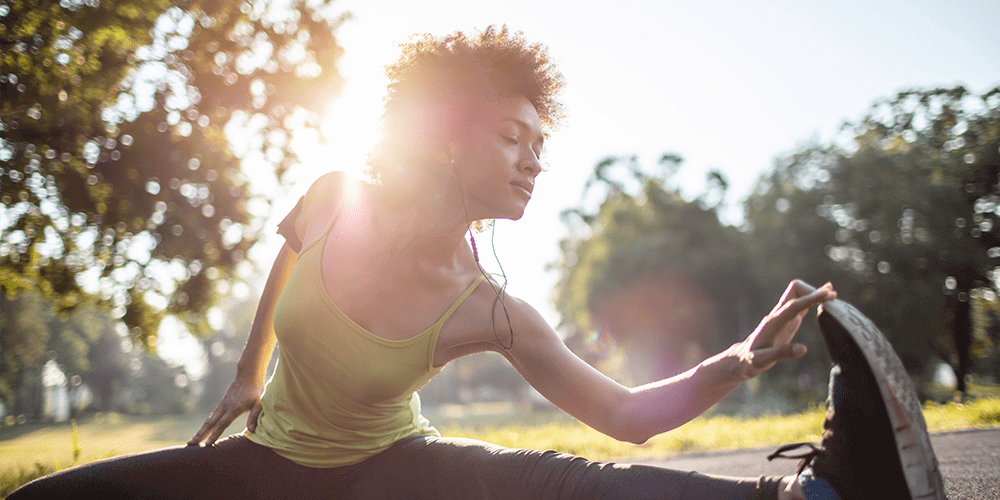Get Moving to Get Better Sleep

Find out how exercise can help kickstart your Best Slept Self®
It’s no secret that exercise has widespread health benefits. It improves your mental and physical health and keeps you focused and energized during the day. It also does wonders for the quality of your sleep by promoting deeper, restorative sleep.
Even knowing all the great benefits that exercise provides, it can be hard to get started and to find the time to make it part of your daily routine. Read on for tips to help get you moving in the right direction.
THE SCIENCE BEHIND EXERCISE AND SLEEP
Physical activity promotes better sleep because it helps regulate your circadian rhythm—your body’s natural sleep-wake cycle.
But according to the National Sleep Foundation’s 2022 Sleep in America® Poll, a lot of us aren’t feeling the positive effects that moderate to vigorous physical activity can have on our sleep health.
Nearly all Americans surveyed reported engaging in some sort of light activity, such as slow walks or household chores, but higher intensity activity was less common. In fact, 36 percent of Americans polled get less than the 2.5 total hours of moderate or vigorous exercise that the CDC says we need each week.
One in 6 Americans reported zero moderate physical activity (such as brisk walking), and 45 percent reported no vigorous exercise (jogging, aerobics, etc) at all. We know that life can get in the way of getting your sweat on, but maybe it’s time to stop making excuses and take it step by step. You can do it!
TAKE TIME TO GET MOVING
Let’s get real: most of us aren’t going to suddenly start working out every day. We need a more practical approach. So, what can you do to enjoy the sleep health benefits exercise can have? If you have a sedentary job that requires sitting behind a desk most of the day, even some light physical activity can greatly improve your sleep health.
Try using your work breaks to take a brisk walk or a do a quick 10-minute mini workout between meetings. Finding 10 to 20 minutes here and there during the day gets your blood pumping, leading to a deeper, more satisfying night of sleep.
EVERY STEP COUNTS
Regular exercise may help you get a good night’s sleep, according to both self-described workout warriors and non-exercisers.
The time of day you choose to work out makes a real difference in certain aspects of your sleep. For instance, morning exercise may help you sleep longer at night, while working out before bed could make it harder to fall fast asleep. We’re all wired differently, so figuring out the best time to use exercise to maximize your sleep quantity and quality can take a little experimentation. Once you figure out what works for you, you’ll be well on your way to an exercise regimen that fits your life.
RISE AND EXERCISE
Morning is the perfect time to enhance sleep potential—and boost cardiovascular conditioning while you’re at it. In fact, people who work out on a treadmill at 7 am sleep more hours each night, have deeper sleep cycles, and spend 75 percent more time in restorative stages of sleep than those who exercise at other times of day.
If you exercise outdoors in the morning, even better—you enjoy the added bonus of exposure to bright sunlight, which also helps regulate your circadian rhythms. If you lift weights, doing so in the morning may help you fall asleep faster at night than those who pump iron later in the day.
Our blood pressure naturally drops 10 to 20 percent at night, which helps the body heal, restore, and recover during those crucial periods of deep sleep. A morning workout appears to contribute to achieving that nighttime decline in blood pressure, so you get the most benefits from sleep. You’ll also experience a rush of exercise-induced endorphins first thing in the morning—brain chemicals that help you feel energized for the rest of the day.
MIDDAY MOVEMENT
Afternoon workouts also have significant sleep benefits. Body temperatures are naturally a few degrees warmer in the afternoon, which can help overall exercise performance because muscles are more pliant and work more efficiently.
Since exercise itself raises your body temperature for four to five hours after you stop working out, an afternoon exercise session means your body temperature will start to lower again close to your bedtime. This is a natural signal to your brain that you are ready to go to sleep and may help you stay asleep during the night.
EXERCISING AT NIGHT
If you like getting your workout in closer to bedtime, keep in mind that vigorous cardio workouts raise your body temperature and heart rate and can disrupt the process of falling asleep.
Try timing your evening aerobics so that you finish your workout one to two hours before going to sleep. This will allow your body temperature to drop and let some of those energy-raising endorphins to leave your system before bed. Yoga and other forms of breathing or stretching exercises are also a great alternative for evening workouts because they naturally encourage relaxation.
Keep in mind that whenever you work out, regular exercise is better for sleep than not exercising at all. It also lifts your mood and helps you maintain a healthy body. Basically, however you incorporate more exercise in your routine, it’s a win-win-win.
